
Safaricom, Kenya’s leading telecom operator, has confirmed ongoing discussions with Elon Musk’s Starlink and other satellite providers, signaling a shift in strategy as competition heats up in its home market, where the telco has long maintained a dominant position.
Peter Ndegwa, CEO of Safaricom disclosed that the company is considering partnerships with Starlink or other satellite providers to ensure cutting-edge technology integration.
A report by the Kenyan Wall Street earlier this month disclosed that Starlink had initially approached Safaricom for a partnership before its entrance into the Kenyan market. However, Safaricom rejected the proposal citing concerns over regulatory oversight due to Starlink’s cross-border service model.
Register for Tekedia Mini-MBA edition 19 (Feb 9 – May 2, 2026): big discounts for early bird.
Tekedia AI in Business Masterclass opens registrations.
Join Tekedia Capital Syndicate and co-invest in great global startups.
Register for Tekedia AI Lab: From Technical Design to Deployment (next edition begins Jan 24 2026).
Recall that Safaricom in August this year, called for stricter regulations on Satellite Internet providers, amid Starlink’s entry into Kenya. In a formal letter addressed to the Communications Authority of Kenya (CAK), Safaricom urged the regulator to consider requiring satellite providers to partner with local mobile network operators.
Part of the letter reads,
“Satellite coverage inherently spans multiple territorial borders and in doing so has the potential to illegally provide services and cause harmful interference within the territorial borders of the Republic of Kenya”.
The telecom giant is advocated for a regulatory framework that ensures satellite providers like Starlink operate under similar conditions as local telecom companies, particularly regarding licensing, service standards, and contributions to the Universal Service Fund, which supports the expansion of telecommunications services to rural and underserved areas.
Meanwhile, in response to Starlink’s entry, Safaricom has upgraded its home fire speeds to maintain its competitive edge in the market. The telco, which dominates various aspects of Kenya’s telecom sector, has recognized the need for collaboration with satellite providers to stay ahead.
Despite initial reluctance, Safaricom CEO Ndegwa has recently acknowledged that talks with Starlink have continued, indicating a pragmatic approach from both sides.
“We have had some discussions, and we will continue to have those discussions to the extent that they complement what we are offering”, he said.
Safaricom’s decision to partner with Musk Starlink sparked mixed reactions from Kenyan Netizens on X,
@Gonza_254 wrote,
“Safaricom is so obsessed with being a monopoly, they don’t want competition, so that they can do what they want”.
@EliakimS16 wrote,
“Which partnership is this? Let’s just have the two operate as it is. We will have better services.”
@nash_nzioka wrote,
“Safaricom has dominated and exploited the market for long. Anti-trust Law should be implemented to deter such kind of collusion and to allow Starlink which is a worthy competitor, to square it with Safaricom.”
@KLukoko wrote,
“Safaricom hates competition, and thrives as an exploitative monopoly. By dangling a partnership deal, means one thing, Safaricom has been rattled.”
The change in Safaricom’s stance change in Safaricom’s stance aligns with comments from Kenya’s President William Ruto, who recently stated that the decision to allow Starlink into the country was driven by the government’s desire to promote healthy competition, which would lead to better quality and more affordable Internet services. President Ruto emphasized that competition encourages innovation, noting that Safaricom had already stepped up its game in response to the new market dynamics.
Starlink on the other hand, has been aggressively expanding its global footprint, aiming to disrupt the telecommunications and ISP sector through its satellite internet service. Musk also confirmed that Starlink will soon have 300 satellites providing continuous coverage over mid-latitudes, enabling direct-to-mobile phone service, a potential game-changer in the telecommunications industry.



